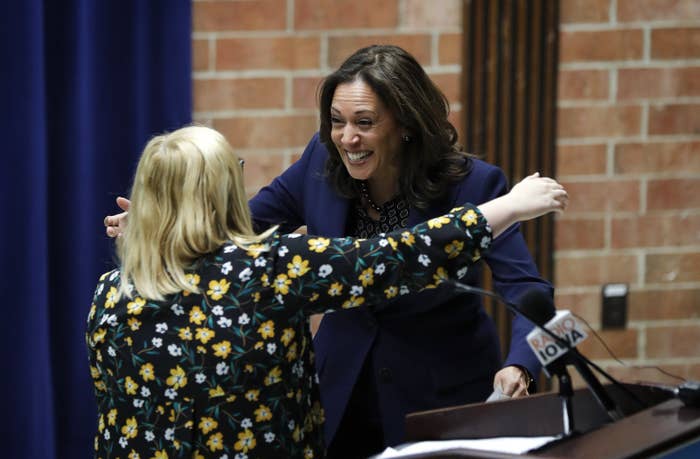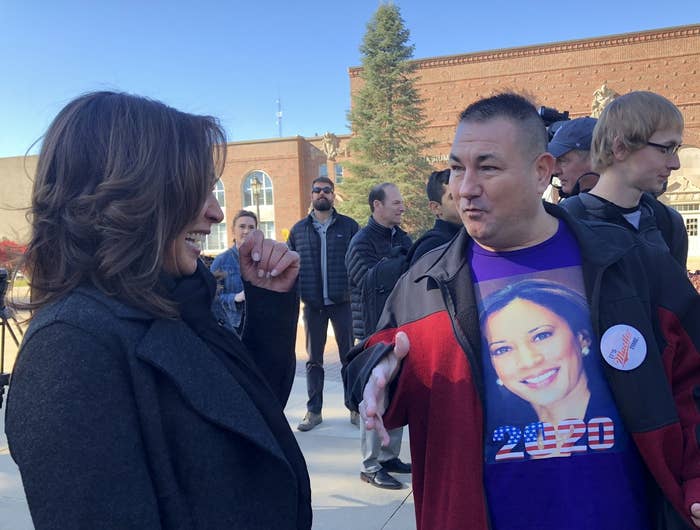
IOWA CITY, Iowa — On her first visit to Iowa as a potential presidential candidate, Sen. Kamala Harris developed a problem with doors: She couldn’t get out of them. She barely finished a speech before she was swarmed, admirers blocking all exits, asking for photographs or looking for conversations with the senator.
There was a certain look people got as they left the crowds that formed around Harris: flushed and giddy, some gushing about what the California senator had just told them. In Ankeny on Monday, a college student left the crowd with tears in her eyes after a conversation with Harris about her rape and the importance of fighting back after the confirmation of Supreme Court Justice Brett Kavanaugh.
On Tuesday in Waterloo, a woman clutching a marker and a pillow cross-stitched with the phrase “A woman’s place is in the White House” ran up to Harris the second she stepped from the podium after a speech.
Ten minutes later, as Harris forced her way out of the front door of the cramped Black Hawk County Democrats’ office, a small throng of admirers followed her onto the street. Every move she made toward the door of a waiting black minivan was thwarted by another request for a selfie.
Farther down the block, two men watched skeptically from a bench. Neither had heard of Harris.
“No idea who that is,” one said, peering into the knot of people and cameras.
The other man said, “I think I’ve heard of him.”
As she mulls a presidential run, Harris’s trip to Iowa had the unmistakable air of celebrity — a celebrity born of social media and MSNBC, many of her supporters said, and amplified by Kavanaugh’s confirmation hearings, where Harris made headlines for her sharp questions on the Judiciary Committee.
But that celebrity is so far limited. The people who spent the beginning of this month glued to the Kavanaugh hearings, or just regularly watch cable news, are already very familiar with Harris. For those who haven’t paid close attention to the news, the California senator’s name didn’t register.
That puts Harris behind some of the other big-name potential Democratic presidential contenders, like Sens. Bernie Sanders and Elizabeth Warren, or former vice president Joe Biden. A poll of the state conducted just before the final Kavanaugh hearings showed 33% of likely 2020 Democratic caucus participants had not heard of Harris, compared to less than 1% for Sanders and Biden, and 3% for Warren.
Harris’s stated purpose for being in Iowa this week: to help the state’s midterm elections candidates. But her first visit also gave her a chance to introduce herself to the voters who will take part in 2020’s first caucuses — particularly to those who may have missed her on TV.
In stump speeches across Iowa, Harris offered a preview of what could become the backbone of a presidential campaign. At the center was a message about the importance of “speaking truths.”
The first two truths Harris chose to speak: first, the reality of racism, sexism, anti-Semitism, and homophobia in America; the second: “This economy isn’t working for working people.”
In the Black Hawk County Democrats’ office in Waterloo, it was the second truth, about a “broken” economy, that prompted the loudest applause. At the University of Iowa, the crowd of mostly young people cheered equally loudly for both.
The two truths are a sign of Harris’s careful balancing of the explicit politics of race and gender — which she has recently encouraged Democrats to confront head-on — with a message of economic populism, including criticizing Republicans’ recent tax bill as a giveaway to the wealthy “that should go to working people,” and proposing her own annual tax credit for middle-class families.
The tax credit didn’t leave much of an impression on Harris’s supporters, who latched less onto policy than onto the feelings they said her speech left them with. Another of Harris’s truths that many said they appreciated: an assertion that “Americans have so much more in common than what separates us.”

As much as Harris drew comparisons to Barack Obama in Iowa, her supporters also couldn’t help but compare her to Hillary Clinton, who some said they’d seen speak in the years running up to her two losing presidential campaigns.
“Hillary was good one-on-one, but [Harris] connects with everyone,” said Gwendolyn Kingsbury, an accountant in Indianola. “She’s a powerful woman — she sucks you in. She just has this natural ability to connect with people.”
Judy Hegen, who saw Harris in Des Moines, said she thought Clinton had been pressured to imitate men during her speeches, at times seeming forced. “Kamala got up on stage and acted like an energized woman,” Hegen said.
“Hillary didn’t have that charisma,” said Mary Corsair, a retired school counselor.
For Corsair, the most memorable moment came after Harris’s speech in Indianola, where she took the arms of a young woman who asked her for advice. They spoke at length, though Corsair didn’t hear what Harris said: Harris’s voice often dropped low when she spoke one-on-one with supporters, at times making her mostly inaudible in the midst of a throng of cameras.
“You want to feel that connection, and I witnessed that when I saw her with that woman,” Corsair said.
Many of the Iowans who turned out for Harris said they had first encountered her on cable news and social media. But it was the Kavanaugh hearings, they said, that epitomized what many saw as one of Harris’s best qualities: strength.
“She was very strong,” said Myskal Kanietova, an accountant in Des Moines. “She can stay strong and be herself by staying dignified. Someone comes at her, and she has very strong comebacks.”
Harris, a first-term senator and California’s former attorney general, repeatedly deflected questions during her two-day swing through Iowa about whether she is planning on running for president in 2020, saying she was focused on the midterm elections.
But many of her fans in Iowa — including one who showed up in Cedar Falls with a custom-made T-shirt printed with Harris’s face and the word “2020” — spoke as though she was already running.
“She would represent me — she would represent all of us,” said Alexandra Rucinski, who drove two and a half hours from Burlington, Iowa, where she works in a diner, to see Harris speak. Rucinski said she’d become involved in politics after her town’s Planned Parenthood closed last June, and she’d been motivated by Harris’s stance on women’s rights.
Rucinski liked Harris’s identity as a “progressive,” she said. She also echoed a common refrain in Iowa: that Harris was a strong candidate for president in part because of her identity, particularly as a woman of color.
“You look at her, and after what we’ve been through, I’d love to replace Trump with that,” said Rucinski of Harris, the daughter of Jamaican and Indian immigrants.
“She’s the female Obama, that’s how I feel,” said Sophia, a government employee in Des Moines who did not want to give her last name. “I think someone with her background — Obama was the same way. Just being who she is, she’s the image of who we want to be.”
Harris’s celebrity was especially apparent among the crowds of college students in Iowa City, who sprinted down a hill, backpacks bouncing, to catch up with her as she led a group to an early voting spot.
She had finally gotten into her car when four young men came to the door to beg her for a selfie; she obliged. As she climbed back in, a pair of students broke out into chants of “Mom-a-la” — a reference to the nickname Harris’s stepchildren use for her.
In Indianola, Harris spoke to a small crowd packed into the back room of a pizza restaurant in the town of 16,000.
“She’s a rockstar — she’s amazing. She kicked butt in the Kavanaugh hearings,” said Amy Ramsey, an occupational therapist in Carlisle, Iowa, who has been following Harris’s work for more than a year, mostly on Twitter. “She’s honest, she’s professional, and she’s strong, which is very important in Iowa.”
But, she added, “I will say — I was bragging to all my friends that I was getting to come and see her, and I was disappointed that most people didn’t seem to know who she was.”
“I’m sure if they did know her, they would love her,” Ramsey said.

